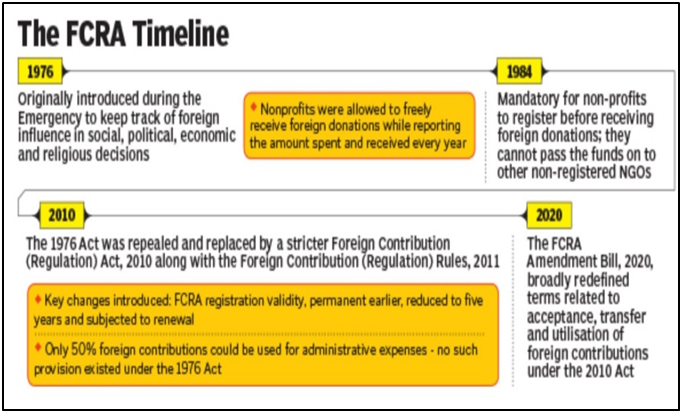Why in news?
- The Foreign Contribution Regulation Act, 2010 (FCRA) registration of two prominent NGOs — Centre for Policy Research (CPR) and World Vision India (WVI) have been cancelled this month.
- The MHA alleged that CPR diverted foreign donations to fund protests and legal battles against developmental projects and misused funds to affect India’s economic interests.
- The registration of WVI was cancelled for alleged FCRA violations from 2012-13 to 2020-21. WVI is the recipient of the highest amount of foreign donations among all NGOs registered under the Act in 1986.
What’s in today’s article?
The Foreign Contribution (Regulation) Act (FCRA):
- Background:
- The Union Ministry of Home Affairs (MHA) monitors the implementation of the FCRA.
- The law sought to regulate foreign donations to individuals and organisations in order for them to function in accordance with the values of a sovereign democratic republic.

- Salient features:
- The FCRA requires every person or NGO seeking to receive foreign donations to be
- Registered under the Act.
- To open a bank account for the receipt of the foreign funds in State Bank of India, Delhi.
- To utilise those funds only for the purpose for which they have been received and as stipulated in the Act.
- To file annual returns and must not transfer the funds to another NGO.
- The Act prohibits the receipt of foreign funds by
- Candidates for elections,
- Journalists or newspaper and media broadcast companies,
- Judges and government servants,
- Members of legislature and political parties or their office-bearers,
- Organisations of political nature.
- Registration under FCRA:
- NGOs seeking foreign funding must submit an online application in a prescribed format, along with the necessary documentation.
- Individuals or organisations with specific cultural, economic, educational, religious, or social programs are eligible for FCRA registration.
- Following the NGO's application, the MHA conducts background checks on the applicant through the Intelligence Bureau and processes the application accordingly.
- The MHA must approve or deny the application within 90 days.
- FCRA registration is valid for 5 years after it is granted. NGOs are expected to apply for renewal within 6 months of their registration expiry date.
- Cancellation of registration:
- The government reserves the right to revoke any NGO's FCRA registration if it discovers a violation of the Act.
- Registration can be revoked if -
- The NGO has not engaged in any reasonable activity in its chosen field for the benefit of society for two consecutive years or if it has become defunct.
- In the opinion of the Central Government, it is necessary in the public interest to revoke the certificate, etc.
- An audit uncovers irregularities in an NGO's finances, such as the misutilisation of foreign funds.
- No cancellation order can be issued unless the person or NGO involved has been given a reasonable opportunity to be heard.
- Once an NGO's registration is cancelled, it is ineligible for re-registration for 3 years.
- The ministry also has the authority to suspend an NGO's registration for 180 days pending an investigation and to freeze its funds.
- All government orders can be challenged in the High Court.
News Summary: FCRA registration for several NGOs cancelled
How many have lost registration?
- Statistics
- Since 2015, the FCRA registration of more than 16,000 NGOs have been cancelled on account of “violation.”
- As on January 22, there were 16,989 FCRA-registered NGOs active in the country.
- Risks of money laundering and terrorist financing
- A 2012 report by the MHA said that the NGO sector in India is vulnerable to the risks of money laundering and terrorist financing.
- Therefore, necessary steps for rigorous enforcement as well as coordination with foreign countries for law enforcement are being taken.










